Presenting the Supporting Actresses of '44. A low class maid, a French baroness, a patriotic nurse, a weary shop-owner and a "Chinese" village woman battled it out for Oscar gold. We're here to re-judge that contest.
THE NOMINEES
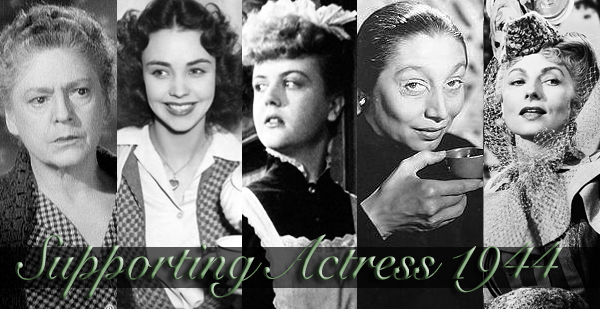 from left to right: Barrymore, Jones, Lansbury, MacMahon, Moorehead
from left to right: Barrymore, Jones, Lansbury, MacMahon, Moorehead
Oscar was still besotted with recent nominees Jennifer Jones & Agnes Moorehead (both on their quick second nominations) but joining the party were two veterans who'd never been honored (Ethel Barrymore & Aline MacMahon) and one very fresh face who would go on to an enviably long cross-platform showbiz career, now in its 73rd year (!) -- Angela Lansbury in her film debut!
Notable supporting roles for women that the Academy passed over in 1944 were Mary Astor (Meet Me in St Louis), Shirley Temple (Since You Went Away), Dame May Whitty (Gaslight), and Joseph Hull & Jean Adair (Arsenic & Old Lace). Can you think of any others?

Here to talk about these five nominated turns, are: critic and writer Mark Harris (Five Came Back), journalist Loren King (The Boston Globe), critic and novelist Farran Smith Nehme (Self Styled Siren), cabarettist and actress Molly Pope, blogger and novelist Matthew Rettenmund (Boy Culture), and your host Nathaniel R (The Film Experience). And now it's time for the main event...
1944
SUPPORTING ACTRESS SMACKDOWN
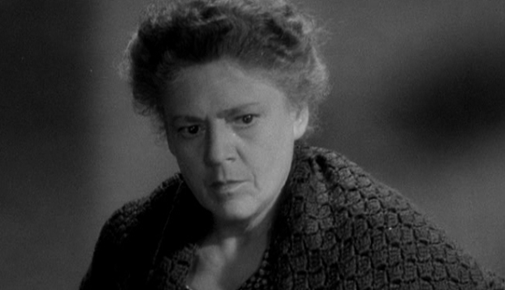
Ethel Barrymore as "Ma Mott" in None but the Lonely Heart
Synopsis: A widowed shop-owner struggles with her business and her untamed son while dying of cancer.
Stats: Then 65 yrs old, 16th film, 1st of four nominations. 29 minutes of screen time (or 25% of the running time).
Mark Harris: MISS Ethel Barrymore, per credits, and as Cary Grant’s poker-faced, devoted, dying mother, what she does emphasizes that honorific: A Great Lady of the Stage condescending to favor Hollywood with her character-actress years. I confess I struggled with her dated over-underacting: The staring into the middle distance, the grimacing to hide (but indicate) pain, the monotone. It’s a professional, humorless, dignity-preserving embodiment of a cliché by someone not yet comfortable on screen. I get it, but I didn’t buy it. ♥♥
Loren King: I wanted to champion another actress just because Barrymore is such an obvious choice. But upon re-watching None But the Lonely Heart, she wins this category hands-down. Her London East End pawn shop proprietor "Ma" Mott is a pivotal role; she is the reason her son Ernie (Cary Grant) settles down, at least for a little while. Barrymore is heart-wrenching in a raw, emotionally layered performance as a mother grown weary of struggle of sacrifice. She is the spiritual center of the story, a movie of social conscience and humanity that's still powerful and relevant today. ♥♥♥♥♥
Farran Nehme: I’ve always disliked this movie, a Cary Grant vehicle for people who find his charm suspicious. None But the Lonely Heart is based on a Richard Llewellyn book, and the difference between this and How Green Was My Valley is the difference between director John Ford and director Clifford Odets. Ethel Barrymore is working very hard as Ma Mott, the mother of Grant’s character. She has thought out the way a terminally ill woman might walk, might listen, even the way she takes a pill. Still, she is a Barrymore, and something regal lurks around her — it’s in the way she listens and reacts — meaning I can never quite accept her as a downtrodden Cockney. Nor do I find a lot of real warmth in her scenes with Grant. ♥♥
Molly Pope: It’s a master class in acting, the art of doing nothing that communicates volumes, waves of reaction crossing her face. But I was always aware I was watching a very good actor act really well, that it was Ethel Barrymore “playing” low class. Her status as a great actress never quite disappears into the character. The role was written by Clifford Odets to tug heartstrings which set her up for a great performance from the jump. It’s too bad the character arc feels cut short and her final scene, though effective, leans into cliche. I would have rather had the scene of her in the shop filled with policemen. The career-culminating Oscar nom (and win). ♥♥♥♥
Matthew Rettenmund: Barrymore was once described as "more regal than royalty." That shines through in his performance, in which she at times carries herself like a member of nobility, yet is throroughly convincing as the long-suffering, cynical mother of a disappointing loafer. Before she succeeds in re-molding her son's attitude, her brusque exchanges with him are breathtaking, cutting through the film's pretty setpieces and movie-star performances. ♥♥♥♥♥
Nathaniel R: Weariness and wariness often walk hand-in-hand though they're different dark clouds and Barrymore let's both hover over her constantly like a storm's-a-brewing. My favorite beat is that stiff laugh with her son when he flirts ("I'm old enough to be your mother!") she knows what kind of man her son is, and she knows this in more ways than one. Still I wish she'd found a way to dramatize the tragedy of her final shifts when she lets her guard down about both shop and son -- those choices are hard to see or fathom. ♥♥♥♥
Reader Write-Ins: "Her face and voice alone are imposing, so it’s not difficult to commune with her character’s life struggle. But the cute moments, with the smirks and the side glances, don’t become her at all." - Jacob (Reader average: ♥♥¾)
Actress earns 24¾ ❤s
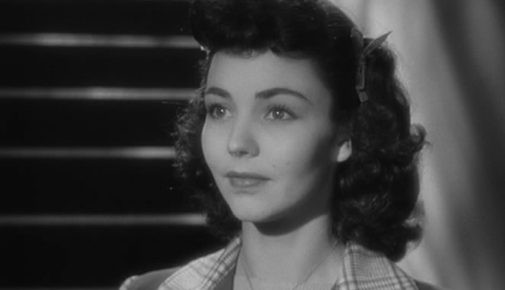
Jennifer Jones as "Jane Hilton" in Since You Went Away
Synopsis: A sweet young girl, training to be a nurse, grows up fast when she loses the men she loves most to the war
Stats: Then 26 yrs old, 4th film, 2nd consecutive nomination (she'd won on her 25th birthday the year prior). 120 minutes of screen time (or 67% of running time).
Mark Harris: As a wartime American girl in love, Jones is earnest, pines nicely, cries effectively, listens well—but she wasn’t an actress who had deep reserves of feeling or who could hold two contradictory thoughts at once, and Claudette Colbert pretty much wipes the floor with her in her big grief scene. Agnes Moorehead and Hattie McDaniel both do more with less here; Jones’s nomination feels like part of an overall stamp of approval for this big, self-impressed WWII homefront melodrama. ♥♥
Loren King: She is radiant as Claudette Colbert’s eldest daughter in this affecting tale of women on the home front. Jones’s scenes with her own husband, Robert Walker playing an affable soldier, have a particular poignancy now (Walker was reportedly seeing Judy Garland at the time). This film’s producer, David O. Selznick, though married, would soon begin an affair with Jones whom he’d marry in in 1949. ♥♥♥
Farran Nehme: I love Jennifer Jones in this movie; so bright, so eager, so headlong in her emotions. In July 1944, when it was released, the newsreels would have been showing intense fighting in both theaters of war. And I imagine that seeing Jones’ character Jane at the dance in the airplane hangar, and then her bidding goodbye to her soldier love in one of the most famous train scenes of them all, must have had a piercing emotional impact. There are flaws, most of them to do with preachy moments in the script, but almost none of them involve Jones. Her scenes with Monty Woolley, as the elderly lodger and the father of her soldier love, draw more real feeling out of that old scene-stealer than he shows in almost any other movie. ♥♥♥
Molly Pope: She has a face made for the camera and cinematic lighting. She knows how to use it. She mastered that middle-distance-gaze of reflection. She’s given a role that takes her from late adolescence into young womanhood, against the backdrop of WWII. That’s a lot working in her favor without acting skill even entering the picture. I felt she pushed the adolescence in the first part too much, but the pay off of the calm, wiser-than-her-years stillness later in the film is worth it. Her character has the clearest and most pronounced dramatic arc of any character in the film. But I don’t see her making any inspired acting choices. Just being really good at exactly what’s on the page. Feels like the “studio-engineered-next-big-star” nom. ♥♥♥♥
Matthew Rettenmund: In this homage to the women left behind during WWII, Jones makes a pleasing ingenue, a love-hungry teen who misses her dad and seeks to replace him post-haste with her mom's handsome lodger/old flame. The meat of her performance comes as she reluctantly falls in love with another lodger's never-good-enough grandson, when she displays palpable vulnerability and skillfully conveys her character's maturity. It's not an indelible turn, but its steel-spined sweetness is engaging. ♥♥♥
Nathaniel R: While Jones's acting style has not dated particularly well -- especially next to timeless Colbert who would have been a major star in any era -- there's an operatic clarity of feeling in big moments (the train station scene! that look in the hay!) that more interior modern acting styles sometimes can't reach. She's a strong enough star within this era / filmmaking context, that she eventually gets to you if you give her time. And she has a lot of that to work with here; I have to deduct a heart because this is absolutely a leading role (with essentially the full middle hour devoted to her as Colbert plays second fiddle). ♥♥♥
Reader Write-Ins: "Hers is radiant Goodness, and though I never stopped wondering about Teresa Wright would’ve done in the role, Jones carries herself with an impressive amount of star charisma." - Nicholas (Reader average: ♥♥♥)
Actress earns 21 ❤s
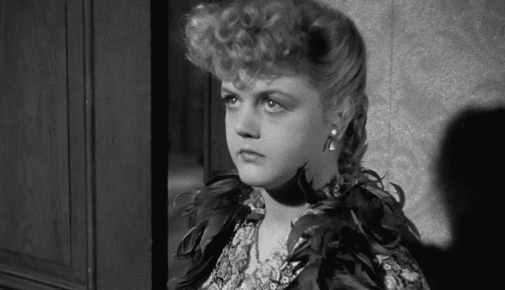
Angela Lansbury as "Nancy" in Gaslight
Synopsis: An impertinent maid at a ritzy townhouse has eyes for her master ...and other men in town.
Stats: Then 19 yrs old, film debut (!), 1st of 3 nominations. 11 minutes of screen time (or 10½% of running time).
Mark Harris: This is a real who’s-she? performance and, for a teenager, an astonishingly assured arrival. Slouchy, vulgar, sullen, smirky, malevolent, sexually jealous, intensely curious, Lansbury brings unnerving self-possession to every moment she has as a housemaid with an ear-grating Cockney accent. Her silent insolence and barely contained disdain have to seem like part of a plot to drive Ingrid Bergman mad, but also like traits she comes by naturally. She walks that line without ever wobbling. ♥♥♥♥
Loren King: Oscar may love a fresh face but Angela Lansbury came up against against an old pro in ‘44. Gaslight marked the movie and acting debut of the 18 year-old Lansbury, whom director George Cukor insisted be cast as Nancy, the salty housemaid who casually pushes Ingrid Bergman’s Paula further toward the brink. It’s a great supporting performance that’s central to the film’s suspense. In any other year, Lansbury would be my pick. It’s a shame she hasn’t won the award, at least not yet. ♥♥♥♥
Farran Nehme: Angela Lansbury’s Cockney maid, Nancy, embodies the nasty side of youth. She has that teenage confidence in her sex appeal and that reckless desire to try it out on anybody that strikes her fancy. Her flirting with Charles Boyer’s Anton always involves a little too much eye contact, a little standing too close. She is also very good with the girl’s selfishness, and being thwarted always brings out a childish quality, a sense that her pursed lips and set jaw could go into a tantrum any moment. But where Lansbury excels most of all is the doubt she manages to sow about whether Nancy, deep down, is bad enough to actively help Anton, or if she is just too selfish even to notice his nefarious doings. ♥♥♥♥
Molly Pope: Lansbury is a genius. And not because we know from every performance since Gaslight that she’s a genius. She’s so effortless, she makes everyone around her on screen look like they’re moving furniture. She’s both a sideline character not meant to have an arc but still uneasily tangled in the action in a way that registers with her. Because this is Nancy’s first job as a maid (presumably) we get to see her learning a lot not just about being a maid, but this highly dysfunctional couple. You can watch Lansbury’s face absorb, process and reach a personal opinion about everything. You know exactly who Nancy is, the typical saucy cockney maid, but imbued with subtlety and inner life. The “out-of-left-field-teenage-prodigy” Oscar nom. ♥♥♥♥♥
Matthew Rettenmund: Seventy-three years later, Lansbury is still alive and her turn as a cunning tart in this psychological thriller is startlingly modern, packed with insolence. When she hits on her boss, she uses those owl eyes to convey she knows exactly what's going on, communicating her willingness to become a part of any dirty deal if it might improve her lot in life. A lusty, gutsy portrayal that would make Jessica Fletcher blush. I was surprised how little she is actually in the picture. ♥♥♥♥
Nathaniel R: The crude force of this arrival! The fiery sullenness and breath-catching entitlement of this "Nancy Lansbury" is something else. I'm fusing the character and actress because both strike me as way above their station. Nancy is but a lowly maid and Lansbury is but a teenage bit player in a freaking INGRID BERGMAN picture but they both act as if they own the place/movie. Especially shocking was that brazen flirtation with her boss in a crucial scene. One imagines that it both offended and aroused back in '44, depending on how willing the individual moviegoer was to project actual sex on to sex-free movies. But is this more a triumph of starpower than acting? There's very little of her in the movie but leaving people thirsty for more sure is a sly way to kick off a career. ♥♥♥♥
Reader Write-Ins: "Wickedly defiant and deliciously bratty, she infuses Nancy with such vitality that it's hard to imagine a lesser actress making as much with the role as she does" - Andy (Reader average: ♥♥¾)
Actress earns 27¾ ❤s
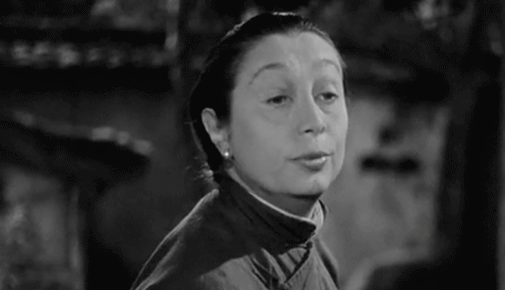
Aline MacMahon as "Ling Tan's wife" in Dragon Seed
Synopsis: The grandmother of a large farming family struggles with political upheavals, family tragedies, changing times, and the hunger of war
Stats: Then 45 yrs old, 30th film, 1st and only nomination. 46 minutes of screen time (or 32 % of running time).
Mark Harris: They don’t make yellowface atrocities like this anymore, thank God. I’m genuinely unsure why the Irish/Russian MacMahon, as a Chinese peasant mother, got recognized: For being marginally more credible than those around her? For infusing the barely speakable Google-translator dialogue with tartness and warmth? For delivering some we’ll-endure stoicism a la Jane Darwell in Grapes of Wrath? She nails the compulsories like a pro, but the only case I can make for this nomination is “It’s not her fault.” ♥
Loren King: Giving Aline MacMahon’s performance as Katharine Hepburn’s mother-in-law in Dragon Seed in no way diminishes MacMahon’s illustrious career. She was a successful stage actress before appearing in many Hollywood films and giving solid supporting performances such as her sassy comic in "Gold Diggers of 1933." But Dragon Seed is an ambitious mess. It was the convention at the time for Caucasian actors to play Asian characters but it just looks ridiculous now. MacMahon does what she can with a fairly one-dimensional role. It’s too bad it would be her only Oscar nomination ♥
Farran Nehme: I have an indulgent fondness for rah-rah patriotic World War II movies, but this one is a bridge too far, despite some strong feminist themes. An all-Western cast plays the Chinese, and the buck-toothed Japanese soldiers are played by Chinese actors. Aline MacMahon is visibly hampered by some wretched eye prosthetics and they really cut down on her range of expression, forcing her face into a perpetual hang-dog look. I would love to know how she was nominated over, say, Mary Anderson in Lifeboat or hell, even Eve Arden in Cover Girl. I can only guess that the MGM voting bloc still had some force in 1944. It hurts to me to rate MacMahon, one of the finest character actresses of the Golden Age, so low, but I cannot tell a lie. Aline, it wasn’t your fault. ♥
Molly Pope: It was almost impossible for me to watch the movie, let alone take a critical eye to performances. I found Aline MacMahon completely forgettable. I appreciate that the role is given some meat as we see an older woman changed/challenged by the conflict around her and the scene with her baby grandson is lovely, but this may as well have been a silent film the writing is so bad. That “makeup” makes it impossible to register facial expressions. Feels like the “ugly” Oscar nom. ♥
Matthew Rettenmund: It's tough going evaluating a yellowface performance, but in the way Luise Rainer overcomes it in The Good Earth (1937) — and unlike Katharine Hepburn's terrible try in Dragon Seed — MacMahon's usurping of another race can almost be accepted, at least in the context of it having happened in 1944, because her maternal warmth feels sincere. Still, it's hard to look past the obvious. She creates great empathy in truly dreary surroundings, but it is perhaps not the most imaginative take. ♥♥♥
Nathaniel R: Oh the (multiple) indignities of Dragon Seed! MacMahon doesn't even get a name! Her husband calls her "old woman" though she ably makes their long marriage feel lived-in. Even the omniscient narrator doesn't know it, referring to her only as "Ling Tan's wife". You may have guessed it's a stock role but she does what she can in less embarrassing way then the others. Her despairing take on "this joyful moment" when she learns she has a new grandson is a rare bit of welcome underplaying. ♥♥
Reader Write-Ins: "MacMahon does an adequate job with offensive casting and a stereotypical role, but she isn’t given much to do here other than look mournful." -Suzanne (Reader average: ♥♥)
Actress earns 11 ❤s
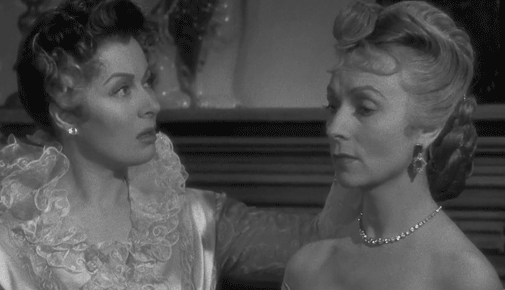
Agnes Moorehead as "Baroness Aspasia Conti" in Mrs Parkington
Synopsis: The former lover of a rich man takes his new wife under her sophisticated wily wing
Stats: Then 44 yrs old, 2nd of four nominations. 26 minutes of screen time (or 21% of running time).
Mark Harris: This might have been a body-of-work nomination, since Moorehead was a delight in everything she did in 1944, but I enjoyed watching her sketch a worldly, decadent, sophisticated baroness so efficiently (she’s ten times as interesting as Greer Garson) and then deepen what could have been a caricature with unexpected notes of warmth, empathy, and playfulness. A shame she’s stuck with the awful line “I am ugly, am I not?”—but there are few surer tickets to a nomination. ♥♥♥
Loren King: The great character actress also appears in Dragon Seed AND Since You Went Away along with her nominated performance as Baroness Aspasia, with a vaguely French accent, who befriends Greer Garson’s working class Susie even though Susie’s new husband was once engaged to the Baroness. I can’t accept that the versatile Moorehead, often the best thing in the movie, never won an Oscar; it’s the reason the supporting category was invented! But Mrs. Parkington isn’t as strong a role as her other three nominations: The Magnificent Ambersons, Johnny Belinda and Hush, Hush Sweet Charlotte ♥♥
Farran Nehme: Agnes Moorehead already showed up in Since You Went Away, in fine villainous form as the black-market queen and town gossip. She isn’t villainous here; she is more like the understanding neighbor she plays in All That Heaven Allows. The movie is from the latter part of Tay Garnett’s career and could have used some judicious cutting, but I think Moorehead and Garson’s scenes together are very touching. ♥♥♥
Molly Pope: She’s wasted in the role. It’s terribly written with no dimension. She has to play it as an amusing/decorative secondary character because, though the plot indicates she has much greater stakes in the proceedings, the scene isn’t there in which she processes anything. We get maybe one revealing facial expression. Otherwise we’re supposed to believe Aspasia is totally fine with the Major marrying someone else. Basically I took away that this is Agnes Moorehead doing her best with not great material or direction and the added novelty of slightly unexpected casting, especially with that accent. Which ultimately is pretty good, but doesn’t hold a candle to some of the other performances. Feels like the “outside-the-casting-box” Oscar nom. ♥♥♥
Matthew Rettenmund: Moorehead was a supporting player in five 1944 films, and three — including this one —were nominated in this category. Dreadful in Dragon Seed, she was fantastically bitchy in Since You Went Away ("Well!") but was clearly at her best here. Required to adopt a convincing French accent, she becomes less herself, which is hard to do considering her singular presence. I love her in this movie — she manages to play a rich, scheming, jealous woman in such a way that the audience comes to appreciate the difficult situation in which she finds herself, as both a guide to a young bride and her love rival. Wonderful, light and feels effortless. ♥♥♥♥♥
Nathaniel R: Moorehead was in seemingly every movie we watched for the Smackdown but who's complaining? Not I! She's such infectious fun as a star that she periodically perks up this glamorous but strangely dull picture with a light fluffy scrumptiousness. The Baroness is a cartoon to some extent, complete with Pepe le Pew accent, but Moorehead is a skillful enough that she can slip in the sadder implications of the Baroness's odd place in the central marriage without flattening her performative souffle, if you will. And performative is the word since Moorehead gets that about Aspasia. If only she were actually French or less underused we could steal the Major's line about her "The greatest thing to come out of France since Lafayette!" ♥♥♥♥
Reader Write-Ins: "a frothy fancy delight in her film adding charm and grace to her scenes. She shows many subtle layers in Aspasia in small delicate ways" - Joel (Reader average: ♥♥♥)
Actress earns 23 ❤s
The Oscar Went To... Ethel Barrymore
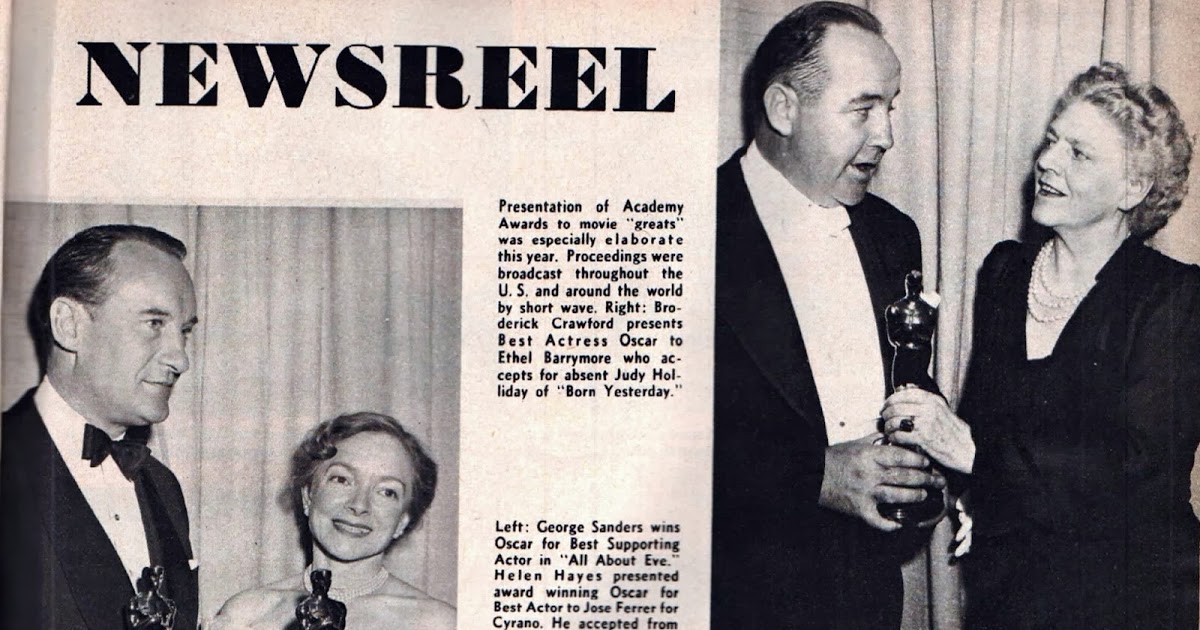 I've never seen a photo of Ethel Barrymore with *her* Oscar but she accepted for Judy Holliday for Born Yesterday (1950) above.
I've never seen a photo of Ethel Barrymore with *her* Oscar but she accepted for Judy Holliday for Born Yesterday (1950) above.
THE SMACKDOWN disagrees and ANGELA LANSBURY manages to win instead, placing Barrymore in the runner-up position. It's worth noting that the race was pretty competitive throughout. That was especially true among reader voting where Jennifer Jones and Agnes Moorehead were the leaders (by a thin margin). Jones eventually won among reader votes. In short: there were lots of differing opinions about who deserved the statue this year! Had Lansbury won at the real ceremony she would have been the youngest winner ever in any acting category at that point in Oscar history. Lansbury never won a competitive Oscar but at least she has that Honorary now!
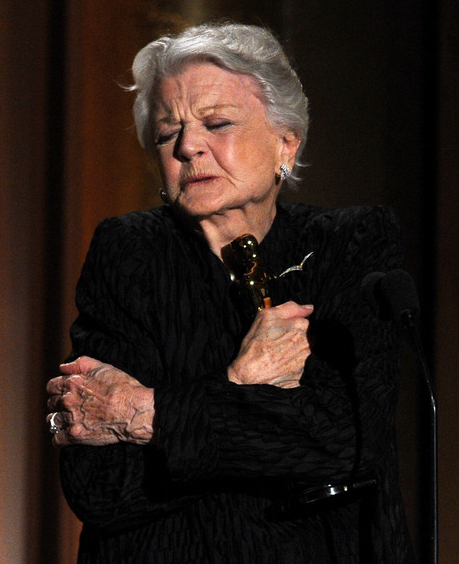
Would you have chosen similarly?

Want more? Listen to the hour long companion podcast where we discuss these films and other '44 pleasures in further detail
Thank you for attending!
Previous Smackdowns ICYMI: 1941, 1948, 1952, 1954, 1963, 1964, 1968, 1973, 1977, 1979, 1980, 1984, 1985, 1989, 1995, 2003 and 2016 (prior to those 30+ Smackdowns were hosted @ StinkyLulu's old site)
NEXT UP? We'll be talking the current Oscar nominations. The Smackdown returns for a new season on February 26th with the Supporting Actress nominees of 2017 with more vintage years to follow including 1994 and 1970 as per your requests.